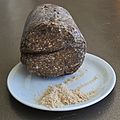Irvingia gabonensis
Irvingia gabonensis is a species of African trees in the genus Irvingia, which is known for its edible fruit and seeds. It is also known by a variety of common names such as wild mango, African mango, or bush mango.
Description[edit]
Irvingia gabonensis trees are evergreen, reaching heights of 40 to 60 feet. The tree produces a fleshy fruit, which is similar to a mango. The fruit is green when unripe, turning a bright orange-yellow when ripe. The fruit contains a single large seed, which is where the valuable Irvingia nut is found.
Distribution and habitat[edit]
Irvingia gabonensis is native to the tropical rainforests of West Africa and Central Africa. It is predominantly found in countries such as Nigeria, Cameroon, Côte d'Ivoire, and Gabon. The tree prefers a humid, tropical climate and is often found near rivers and streams.
Uses[edit]
The fruit of the Irvingia gabonensis tree is consumed fresh, while the seed is often used in African cuisine for its high fat and protein content. The seed is also ground into a powder and used as a thickening agent in soups and stews. In addition to its culinary uses, Irvingia gabonensis has been investigated for potential medicinal properties, particularly in relation to obesity, diabetes, and high cholesterol.
Cultivation[edit]
Cultivation of Irvingia gabonensis is relatively straightforward, with the tree being propagated from seed. The tree is tolerant of a range of soil types, provided they are well-drained. It prefers a position in full sun or partial shade.
Conservation[edit]
While Irvingia gabonensis is not currently listed as threatened or endangered, habitat loss due to deforestation and over-harvesting for timber and food are potential threats to the species.
See also[edit]
-
Irvingia gabonensis fruit
-
Ndo'o (en pain)
Ad. Transform your life with W8MD's Budget GLP-1 injections from $75


W8MD offers a medical weight loss program to lose weight in Philadelphia. Our physician-supervised medical weight loss provides:
- Weight loss injections in NYC (generic and brand names):
- Zepbound / Mounjaro, Wegovy / Ozempic, Saxenda
- Most insurances accepted or discounted self-pay rates. We will obtain insurance prior authorizations if needed.
- Generic GLP1 weight loss injections from $75 for the starting dose.
- Also offer prescription weight loss medications including Phentermine, Qsymia, Diethylpropion, Contrave etc.
NYC weight loss doctor appointmentsNYC weight loss doctor appointments
Start your NYC weight loss journey today at our NYC medical weight loss and Philadelphia medical weight loss clinics.
- Call 718-946-5500 to lose weight in NYC or for medical weight loss in Philadelphia 215-676-2334.
- Tags:NYC medical weight loss, Philadelphia lose weight Zepbound NYC, Budget GLP1 weight loss injections, Wegovy Philadelphia, Wegovy NYC, Philadelphia medical weight loss, Brookly weight loss and Wegovy NYC
|
WikiMD's Wellness Encyclopedia |
| Let Food Be Thy Medicine Medicine Thy Food - Hippocrates |
Medical Disclaimer: WikiMD is not a substitute for professional medical advice. The information on WikiMD is provided as an information resource only, may be incorrect, outdated or misleading, and is not to be used or relied on for any diagnostic or treatment purposes. Please consult your health care provider before making any healthcare decisions or for guidance about a specific medical condition. WikiMD expressly disclaims responsibility, and shall have no liability, for any damages, loss, injury, or liability whatsoever suffered as a result of your reliance on the information contained in this site. By visiting this site you agree to the foregoing terms and conditions, which may from time to time be changed or supplemented by WikiMD. If you do not agree to the foregoing terms and conditions, you should not enter or use this site. See full disclaimer.
Credits:Most images are courtesy of Wikimedia commons, and templates, categories Wikipedia, licensed under CC BY SA or similar.
Translate this page: - East Asian
中文,
日本,
한국어,
South Asian
हिन्दी,
தமிழ்,
తెలుగు,
Urdu,
ಕನ್ನಡ,
Southeast Asian
Indonesian,
Vietnamese,
Thai,
မြန်မာဘာသာ,
বাংলা
European
español,
Deutsch,
français,
Greek,
português do Brasil,
polski,
română,
русский,
Nederlands,
norsk,
svenska,
suomi,
Italian
Middle Eastern & African
عربى,
Turkish,
Persian,
Hebrew,
Afrikaans,
isiZulu,
Kiswahili,
Other
Bulgarian,
Hungarian,
Czech,
Swedish,
മലയാളം,
मराठी,
ਪੰਜਾਬੀ,
ગુજરાતી,
Portuguese,
Ukrainian




